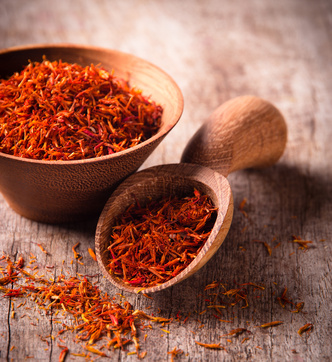by
Stepy —
September 17, 2018
- Like most spices, saffron comes with its own unique health benefits.
- Let’s look at the health benefits of saffron.
- Brain health:
- Saffron contains a compound called crocin, which is believed to be the compound responsible for its brain benefits.
- Saffron can help promote learning, memory function, and recall capacity.
- Depression:
- This spice has shown benefits in treating depression. A study published in 2005 in the journal Phytotherapy Research showed that saffron was more effective than a placebo in treating mild to moderate depression. Another study published in BMC Complementary and Alternative Medicine journal showed that saffron was as effective as depression medication.
- Immune booster:
- Saffron is an excellent source of vitamin C and vitamin B6, both of which are essential for a healthy immune system.
- “Vitamin C is an infection fighter; iron purifies your blood; and the vitamin B6 content helps form red blood cells and assures nerves will function as they should,” states Dr. Joseph Mercola.
- Premenstrual syndrome:
- Saffron may help relieve symptoms of PMS. A study from the British Journal of Obstetrics and Gynecology showed that those who took saffron extracts had a significant decrease in PMS symptoms compared to those who took a placebo.
- Weight loss:
- Saffron is helpful in a weight loss diet because it has the ability to suppress the appetite and reduce cravings for fattening foods. Saffron helps increase levels of the hormone serotonin in the brain, which helps prevent us from overeating.
- A small study published in the journal Nutrition Research shows promise in saffrons ability to control compulsive eating. The study showed that those who added saffron into their diet had a decrease in snacking.
- For the health benefits of turmeric.
- REFERENCES:
- 1. “What Is Saffron Good For?” Mercola.com. Dr. Joseph Mercola, n.d. Web. 16 Dec. 2013.
- 2. “Satiereal, a Crocus Sativus L Extract, Reduces Snacking and Increases Satiety in a Randomized Placebo-controlled Study of Mildly Overweight, Healthy Women.” National Center for Biotechnology Information. U.S. National Library of Medicine, n.d. Web. 16 Dec. 2013.
- 3.”Comparison of Crocus Sativus L. and Imipramine in the Treatment of Mild to Moderate Depression: A Pilot Double-blind Randomized Trial.” National Center for Biotechnology Information. U.S. National Library of Medicine, n.d. Web. 16 Dec. 2013.
- 4. “Crocus Sativus L. in the Treatment of Mild to Moderate Depression: A Double-blind, Randomized and Placebo-controlled Trial.” National Center for Biotechnology Information. U.S. National Library of Medicine, n.d. Web. 16 Dec. 2013.
- 5. “Crocus Sativus L. (saffron) in the Treatment of Premenstrual Syndrome: A Double-blind, Randomised and Placebo-controlled Trial.” National Center for Biotechnology Information. U.S. National Library of Medicine, n.d. Web. 16 Dec. 2013.
- 6. “Nutrition Facts and Analysis for Spices, Saffron.” Self Nutrition Data. Self Nutrition Data, n.d. Web. 16 Dec. 2013.
-
-


















